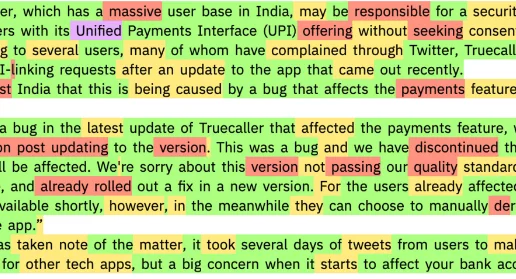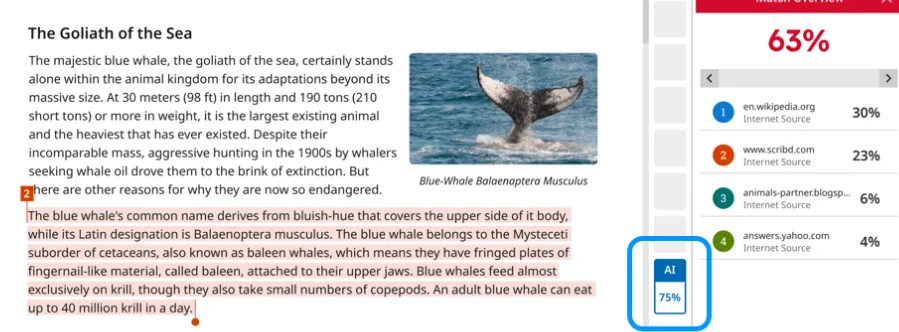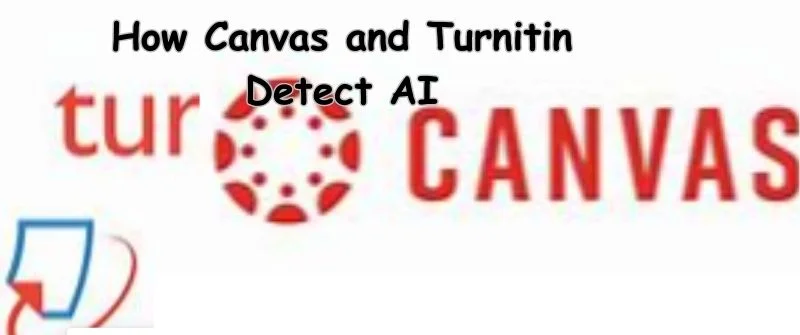Turnitin and Canvas can be considered online platforms that are utilized for educational purposes and therefore contain features that enable them to identify any form of academic dishonesty, such as plagiarism.
ChatGPT, which is an artificial intelligence (AI) language model, can easily and promptly generate academic assignment content that students can submit as their work.
As a result, various online plagiarism-checking tools such as Turnitin and Canvas have been updated in such a way that they can also detect AI-generated content and flag it as plagiarized.
Can Canvas Detect ChatGPT?
The answer to this question is yes. Canvas can detect AI-generated content from ChatGPT through Turnitin.

Though Canvas has been using Unicheck online tool to detect plagiarism, it now uses Turnitin as of the year 2023 to detect content generated through ChatGPT.
The issue of generating content through artificial intelligence has recently been on the rise, and Turnitin is one of the first tools to develop a system that can flag AI content from ChatGPT.
This is the reason why Canvas uses Turnitin’s services to help it detect AI content.
Various institutions and instructors worldwide require students to submit their work through Canvas because it helps detect plagiarism. Plagiarism is an academic offense because it involves using other people’s ideas and considering them your own without giving those people credit. This is what Canvas, through the Unicheck tool, checked in every assignment submitted through it.
However, ChatGPT cannot be considered a person because it is an AI. Though this is the case, by using ChatGPT, it means that the student has submitted an assignment that they have not written. This is also considered an academic offense, so Canvas can now detect AI content from ChatGPT and flag it as plagiarized.
Can Turnitin Detect ChatGPT?
As aforementioned, Canvas uses Turnitin’s services to detect AI-generated content. Therefore, Turnitin can automatically detect ChatGPT content. Recently, there has been an increase in AI writing tools, and Turnitin is applying AI-powered solutions to combat any form of academic misconduct committed through AI.
Turnitin can detect any AI-generated content in Turnitin Originality, Turnitin Feedback Studio (TFS) with Originality, TFS, Simcheck, Turnitin Similarity, Originality Check, and finally Originality Check+.
According to Turnitin, their AI detector reaches out to about 62 million students while supporting over 10,700 institutions and more than 2.1 million educators. Turnitin is so good at detecting AI-generated content to the extent of having a 98% confidence level in addition to having less than a 1% rate of false-positive.
What this means is that Turnitin is an effective tool that institutions, educators, and students can trust in detecting any content that ChatGPT has generated. You may wonder why you should use Turnitin’s AI detector as a student. The reason for this is that when your work has been found to contain AI content, there is a great possibility that you will get a poor grade.

Additionally, if you use ChatGPT to complete your assignments, Turnitin will flag you. Therefore, scanning your work for AI content through Turnitin is important before submitting your final essays or papers to avoid academic consequences.
Why Do Most Plagiarism Scans Fail to Scan AI Content Like ChatGPT?
Most plagiarism scans fail to scan AI content like ChatGPT because they have been programmed to compare the submitted papers and essays with databases that contain existing material and find similarities.
In the case of AI material, however, the generated content is unique thanks to the complex algorithms that are used.
Content that has been generated by ChatGPT is not sourced from databases that contain existing sources hence the reason why most plagiarism scans cannot detect AI content.
Additionally, the content that has been generated by ChatGPT is usually different from the content that has been generated by humans. Most plagiarism scans have been trained to detect common language usages and writing patterns that are unique to humans. Because of this, such plagiarism scans may be incapable of identifying content that has been generated by ChatGPT.
Though some of the plagiarism scans do not detect AI content like ChatGPT, as a student, it is not recommendable to use AI to complete your assignments because it is unethical.
Furthermore, if your educator or institution uses Turnitin or Canvas to scan your papers or essays, you will be flagged and therefore face disciplinary actions that can include failing the course, suspension, and even expulsion from the institution. It is always good to maintain academic integrity.
Why Turnitin Quickly Developed AI Plagiarism Scan
As aforementioned, Turnitin, just like Canvas, was developed to detect any form of plagiarism in content that humans have written. With the advancement of technology came the development of AI models that can instantly generate unique content for students.

Those AI models do not generate content like humans hence the reason why they could not be detected by most plagiarism scans.
In response to this, Turnitin developers came up with plagiarism scans that are also powered by artificial intelligence to combat the wide usage of AI writing tools like ChatGPT by students.
Many students who learned about AI writing tools quickly turned to them as their assignment writing solution.
Since any academic essay or paper that has not been created by the student from scratch is considered plagiarized, Turnitin had to respond fast and include a system that could also detect AI content.
Turnitin’s scans utilize machine learning algorithms that are meant to evaluate huge data volumes and determine the similarities or patterns in word usage, sentence structure, and writing styles. If there is plagiarism within the AI-generated material, then Turnitin will detect it. Since Turnitin uses AI-powered algorithms, it also can adapt and learn over time just like ChatGPT and other AI writing tools.
As more data becomes available, Turnitin will continue to improve its capability of detecting AI content. In a nutshell, it was important for Turnitin to quickly develop an AI plagiarism scan to combat the increasing usage of AI models such as ChatGPT in creating academic content.
This is because Turnitin is in the business of upholding academic integrity and preventing any form of academic dishonesty.
The Plagiarism Scans that Effectively Detect AI Content
Listed below are some of the available online plagiarism scans that can detect content generated by artificial intelligence models such as ChatGPT. They include:
1. ZeroGPT
ZeroGPT is among the plagiarism scans capable of detecting content that artificial intelligence models have generated. You only need to copy the text, paste it within a designated area within the scan’s webpage and click “scan.” This action will give you the overall score of AI content.
2. Turnitin
As discussed, Turnitin is among the leading AI-detecting plagiarism scans that utilize AI algorithms to combat AI use in academic settings.
3. Originally.AI
This is also an effective tool to check any content that has been generated by Ai.
4. CopyLeaks
CopyLeaks is an online plagiarism-checking tool that is dedicated to detecting any content that has been generated by AI models. It also detects various forms of plagiarism that have been committed through AI.
5. Winston AI
Winston AI is also an online tool that is dedicated to detecting any content that has been plagiarized through artificial intelligence.
6. GPTRadar
Finally, GPTRadar is an application used to detect any text generated by artificial intelligence models such as ChatGPT.
